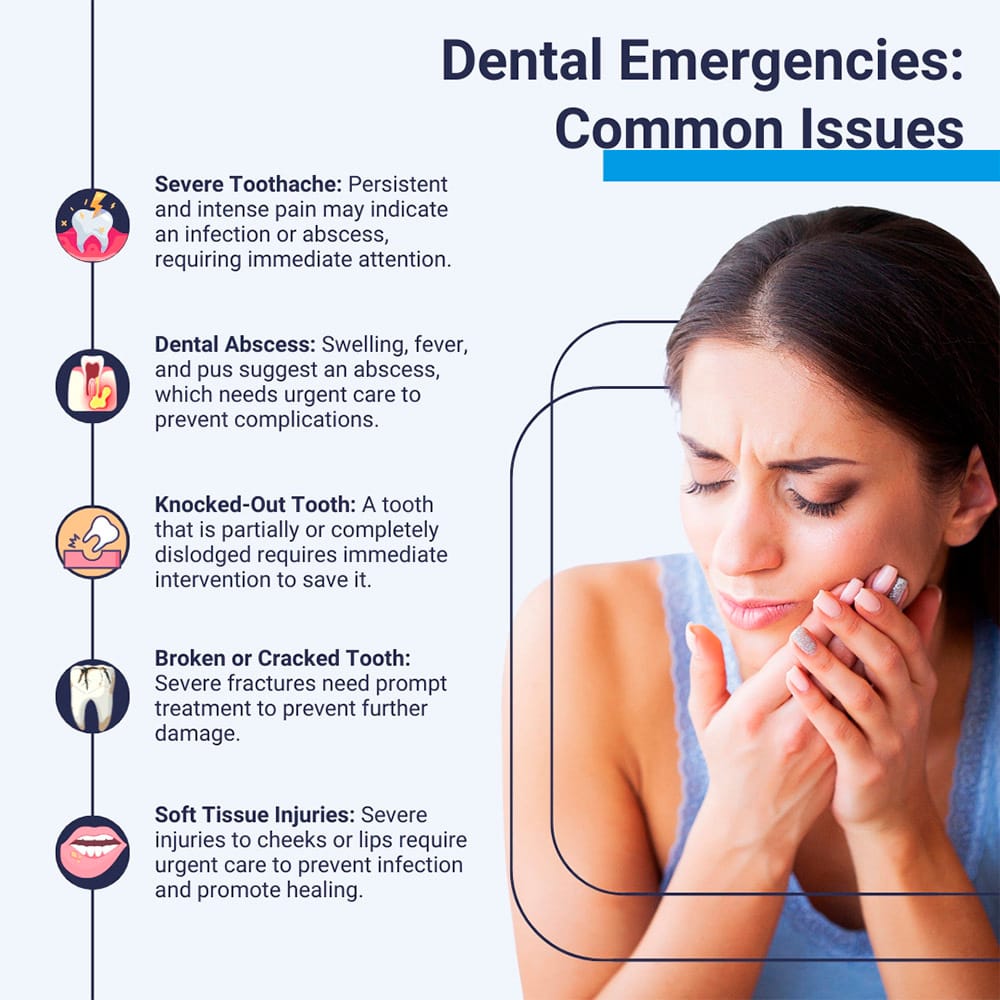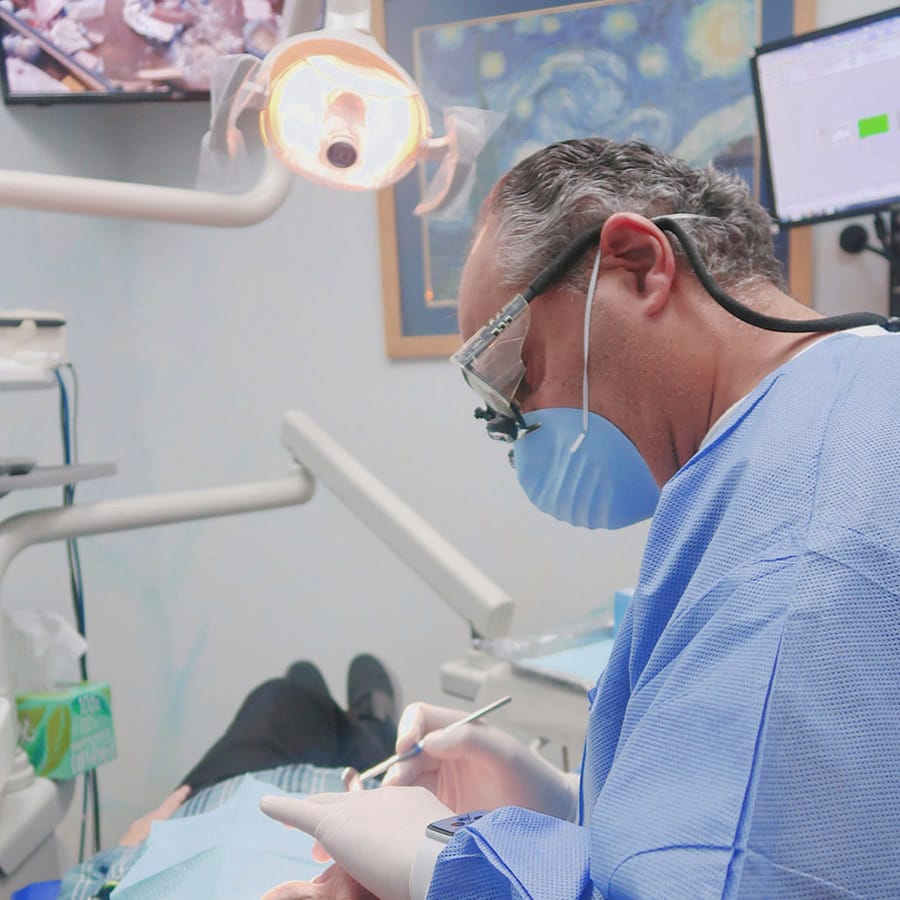What Is Emergency Dental Care?
You will need emergency dental care if you have a problem requiring immediate help and attention. Some emergencies are less urgent than others, but quickly seeing a dentist is important if you have severe pain, continuous bleeding, or a severe dental or facial injury.
What to Do First in a Dental Emergency in Nassau County
The first thing to do is to contact Clock Tower Dental. It’s a great idea to ensure you have our contact number on your phone so you can get ahold of us quickly.
You can talk to our friendly and compassionate dental team when you contact us. They have a wealth of useful information at their fingertips. Our team can determine if the problem requires immediate dental care and schedule an appointment with our dentist.
How Soon Can I See a Dentist for a Dental Emergency?
We realize that dental emergencies can be very upsetting or frightening, and we try to see patients in pain quickly, often on the same day.
If we determine the problem is less urgent, we can still provide useful information on the phone on how to cope with the situation until your appointment.
What to Expect When You See an Emergency Dentist in Franklin Square, NY
During your appointment, we can provide immediate dental care to diagnose the problem and relieve discomfort and pain. Our Franklin Square emergency dentists may wish to take diagnostic images like digital dental X-rays or a cone beam CT scan to assess the problem more thoroughly.
We may not be able to resolve the issue during a single visit. The main purpose of this appointment is to diagnose the problem and provide immediate pain relief.
Which Problems Are Considered a Dental Emergency?
Below are some of the situations where we recommend seeing a dentist urgently.
- Severe and continuous toothache.
- Dental abscess.
- Partially or completely knocked out tooth.
- Badly broken or cracked tooth.
- Severe injuries to your soft tissues like cheeks or lips.

Severe and Continuous Toothache
A severe toothache can be extremely debilitating and will require urgent dental care. While you wait, try rinsing your mouth with warm water and carefully floss around the tooth. This will help remove any impacted food that could dislodge the tooth slightly and cause discomfort.
Use over-the-counter pain relief, but please don’t put painkillers like aspirin on your gums or a tooth. This will not relieve the pain but could damage your gum tissue.
Dental Abscess
A dental abscess is a severe infection that causes swelling around the tooth root. You may notice a small pimple has begun to develop on the gum where pus is building up.
If you have a dental abscess, you must see our emergency dentist or another dentist quickly. The infection can spread without treatment, making you feel unwell or feverish. In rare cases, it can become life-threatening.
While waiting for your appointment, one option is to try to draw out the pus by rinsing your mouth with a warm saltwater solution. You can make this at home by dissolving half a teaspoon of salt in a cup of water and use it to rinse your mouth several times a day.
Partially or Completely Knocked out Tooth
Both these situations require urgent dental care. If the tooth is partially knocked out, we must assess it, and we may want to stabilize it by splinting it to the adjacent tooth.
Knocked-out teeth are a true dental emergency; you must visit us or another dentist within half an hour to an hour after the accident. Retrieve the tooth and rinse off any visible dirt. Try not to handle the tooth by its root, and do not remove any tissue fragments.
If you feel able, you can try to reinsert the tooth. Ensure it faces the right way around, but don’t try forcing it back in place. You must still come and see us.
Otherwise, store the tooth in a small container with some milk or water with a pinch of salt. You can also purchase special solutions to restore knocked-out teeth over the counter in your local drugstore.
Badly Broken or Cracked Tooth
We need to assess a severely damaged tooth quickly, even if the damage isn’t causing you any pain. Sometimes, it can affect the dental pulp, and you may require prompt root canal treatment to save the tooth so it can be restored properly.
After your accident, rinse your mouth with warm water to remove loose pieces of tooth and save them to bring them with you to our dental office. If your mouth is bleeding, use a clean piece of gauze and apply gentle but firm pressure to stop it.
Severe Injuries to Your Oral Tissues
If you have an injury to your lips, cheeks, gums, or tongue and which is bleeding, use clean gauze and firm pressure to stop the bleeding. You can also use a damp teabag as the tannins help slow bleeding by contracting blood vessels.
After you apply pressure, the bleeding should stop within 15 to 20 minutes. If it doesn’t, it’s best to visit your nearest ER to see an emergency dentist.
When Should I Go Straight to the ER For a Dental Emergency?
There are certain times when you should go straight to your nearest ER for a dental problem. These include any serious injuries to your jaws or facial bones, uncontrollable bleeding, or if you have a severe tooth infection that is causing a fever, facial swelling, swollen lymph glands in your neck, and where you feel very unwell.
When Is Less Urgent Dental Care Necessary?
Not all dental problems require urgent attention, but you still need to see our dentist quickly. Some examples of less urgent problems are outlined below.
- Broken or lost dental restorations.
- Mild toothache.
- Broken braces or dentures.
- Getting something stuck between your teeth.
- Minor injuries to your oral tissues.
All of the above situations will require professional dental care, so you must get in touch with us to schedule an appointment. When you contact Clock Tower Dental, we can offer useful advice and information on how to cope with the issue until your appointment.
However, some cases, such as severe tooth infections or extensive damage, may require emergency tooth extraction. Prompt attention could prevent you from searching for an emergency dentist open on Sunday and experiencing worsening pain that may need more complex and costly treatment.
How to Reduce Your Risk of Dental Emergencies
Not all dental emergencies are unavoidable, but you can take steps to reduce your risk.
Schedule Regular Dental Checkups and Hygiene Appointments
Regular dental exams and hygiene appointments are an important part of your preventive dental care plan.
They allow us to check your teeth carefully to quickly pick up any signs of problems, for example, a filling that may have begun to leak and fail. Prompt treatment can avoid larger problems like a severe toothache or dental abscess.
Hygiene appointments where we can clean your teeth professionally are an easy and effective way to help maintain strong, healthy teeth and gums.
Purchase a Custom-Made Mouthguard
Many dental injuries are avoidable or minimized with a good custom-made mouthguard.
Our dental office can provide sports mouthguards that are comfortable to wear and stay firmly in your mouth but don’t hinder breathing. We can ensure your mouthguard provides maximum protection for your teeth, gums, and jaws while you enjoy your chosen sports.
Teeth grinding and clenching are other issues that can crack or fracture teeth and cause gum recession and jaw joint pain. A custom-made night splint will protect your teeth and jaw joints, reducing the risk of dental injuries.
Keep an Eye on Your Dental Health
Between your dental exams, it’s worth keeping an eye on your dental health and noting if something feels wrong or if a tooth has started to feel uncomfortable, even if it’s only occasionally. Getting treatment earlier will help reduce your risk of experiencing a dental emergency.
Clock Tower Dental focus is always on providing the finest emergency care as quickly as possible. We can usually see you the same day. Call our office for number (516) 352-1000 if you have a emergency dental treatment in Franklin Square, and we will make every possible effort to see you immediately.

